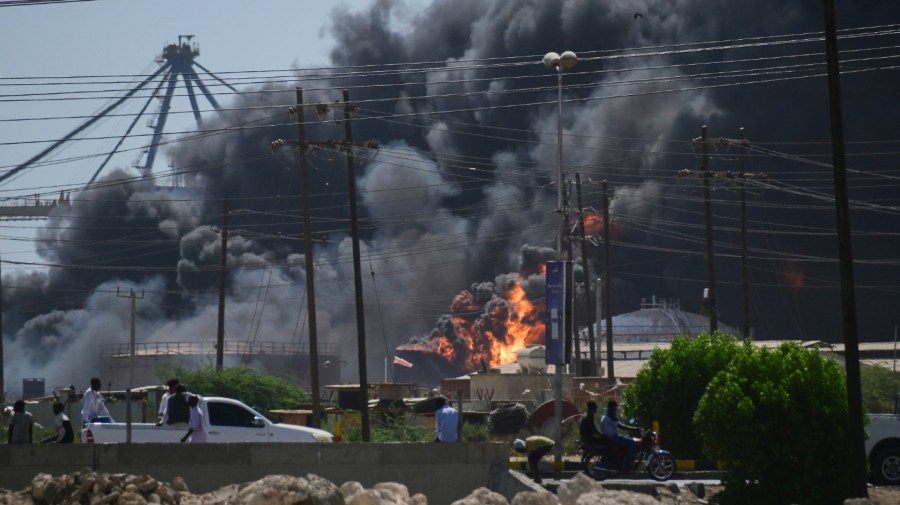World
U.S. Faces Challenges in Addressing Sudan’s Genocide Threat

The United States and the global community find themselves in a precarious position regarding the prevention of genocide in Sudan. As of 2023, the options available to address this humanitarian crisis are significantly limited compared to the situation just a year and a half ago.
The ongoing violence in Sudan has raised alarms over the potential for widespread atrocities, particularly in regions like Darfur. Since the military coup in October 2021, the country has experienced escalating violence, leading to the deaths of thousands and the displacement of millions. The U.S. government, under former President Donald Trump, had previously taken steps to address the situation, yet the current landscape presents new challenges.
Geopolitical Landscape and International Response
The international response to the crisis in Sudan has been complicated by shifting alliances and priorities. The United Nations and the African Union have called for immediate action to protect civilians, but effective measures remain elusive. Sanctions imposed on Sudanese leaders have had limited success in curbing violence. In light of these developments, the international community is grappling with how to effectively intervene.
According to reports from the International Criminal Court, the situation in Sudan has deteriorated to a point where the risk of genocide is no longer theoretical. The court has urged nations to take decisive action, warning that failure to respond could lead to catastrophic consequences. The conflict, primarily fueled by ethnic tensions and power struggles, has created an environment where atrocities can occur with impunity.
Despite the urgency of the situation, the United States has been criticized for its lack of a cohesive strategy. The Biden administration has expressed concern but has yet to implement comprehensive measures to prevent further violence. As the international community debates the best course of action, the window for effective intervention narrows.
Challenges Ahead for U.S. Leadership
Moving forward, U.S. leadership is crucial in galvanizing a global response. Diplomatic efforts must be strengthened to engage regional powers and encourage cooperation in addressing the crisis. The complexities of the political landscape in Sudan require a nuanced approach, balancing humanitarian aid with strategic pressure on those perpetuating violence.
The challenge lies not only in mobilizing resources but also in fostering a unified stance among nations. Historical precedents show that divided responses often lead to failure in preventing atrocities. The need for collaboration between international organizations, such as the United Nations and the African Union, is more pressing than ever.
As the situation evolves, it is imperative for the United States to reassess its strategies and leverage its influence to build a coalition that prioritizes human rights and protection for civilians. The potential for genocide in Sudan is a stark reminder of the consequences of inaction. The international community must act decisively, or risk witnessing a humanitarian disaster that could haunt future generations.
In conclusion, while the options for intervention may be limited, the responsibility to act remains. The stakes are high, and the world is watching as the United States navigates this complex crisis.
-

 Science1 month ago
Science1 month agoIROS 2025 to Showcase Cutting-Edge Robotics Innovations in China
-

 Science2 weeks ago
Science2 weeks agoUniversity of Hawaiʻi at Mānoa Joins $25.6M AI Initiative for Disaster Monitoring
-

 Lifestyle1 month ago
Lifestyle1 month agoStone Island’s Logo Worn by Extremists Sparks Brand Dilemma
-

 Health1 month ago
Health1 month agoStartup Liberate Bio Secures $31 Million for Next-Gen Therapies
-

 World1 month ago
World1 month agoBravo Company Veterans Honored with Bronze Medals After 56 Years
-

 Politics1 month ago
Politics1 month agoJudge Considers Dismissal of Chelsea Housing Case Citing AI Flaws
-

 Lifestyle1 month ago
Lifestyle1 month agoMary Morgan Jackson Crowned Little Miss National Peanut Festival 2025
-

 Health1 month ago
Health1 month agoTop Hyaluronic Acid Serums for Radiant Skin in 2025
-

 Science1 month ago
Science1 month agoArizona State University Transforms Programming Education Approach
-

 Top Stories1 month ago
Top Stories1 month agoIndonesia Suspends 27,000 Bank Accounts in Online Gambling Crackdown
-

 Sports1 month ago
Sports1 month agoMel Kiper Jr. Reveals Top 25 Prospects for 2026 NFL Draft
-

 Business1 month ago
Business1 month agoTruist Financial Increases Stake in Global X Variable Rate ETF









